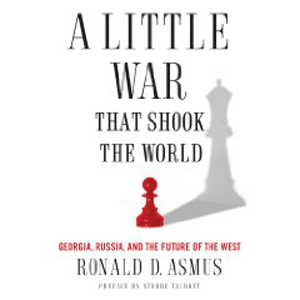 “Several high-ranking representatives of President Bush’s administration discussed possibility to involve war in August of 2008,” wrote Ronald Asmus (http://www.gmfus.org/publications/author.cfm?id=11) in his new book “A Little War that Shook the World” (http://www.amazon.com/Little-War-that-Shook-World/dp/0230617735).
“Several high-ranking representatives of President Bush’s administration discussed possibility to involve war in August of 2008,” wrote Ronald Asmus (http://www.gmfus.org/publications/author.cfm?id=11) in his new book “A Little War that Shook the World” (http://www.amazon.com/Little-War-that-Shook-World/dp/0230617735).
Asmus was assistant to US state secretary in European issues during President Clinton’s Administration. Now, he is head of Transatlantic Center at Marshall Foundation in Brussels.
News Agency Bloomberg and British edition the Sunday Times published review of his book. Unknown materials were published in the book and it relies on the interviews with western and Georgian officials. However, it does not provide the position of Russian Federation because, as the author wrote, Russian officials refused to give interview to him.
In accordance to the Bloomberg review, the book exposes how Russia took advantage of the different positions between the USA and Europe to halt Georgia’s striving towards Europe.
Author of the book wrote “several officials from White House” supported conduction of “least limited military operations, like air-attacks and bombing of Roki Tunnel.”
“However, four days after the war started, Bush stopped similar discussions. During the high-level meeting in the White House, they concluded that “every military step of the USA could cause confrontation with Moscow,” said Asmus.
The book exposes the recent controversy between Bush and Vice-president Dick Cheney at the end of Bush’s presidency.
The controversy, according to the book author, dealt with Georgia too because advisors of Cheney though Bush had allowed Russia to attack Georgia when he did not reply anything to “obvious threats” of Putin during their meeting in Sochi in April of 2008.
The book also provides the extract of the conversation between President Saakashvili and Putin during their meeting in February of 2008; the recording was prepared by Georgian side.
“Do you think Americans can be trusted and do you think they will rush to help you? Nobody can be trusted! Except me,” Putin told Saakashvili in accordance to this recording; “little war” is also mentioned in this recording.
EU and the USA had controversy in the strategy to integrate Georgia with the West. According to the book author, one of the reasons of this controversy was President Saakashvili. European capitals considered Saakashvili to be “US supported hot-headed president who creates problems.”
Asmus also wrote that one of the US high-ranking officials “was astonished” about obscure text of cease-fire agreement which was signed as a result of the mediation of French President Nikolas Sarkozy.
According to the book, when Sarkozy arrived in Tbilisi, he categorically demanded Saakashvili to sign the agreement because Georgia could not receive better conditions from Russia.
“Where is Bush?! Where are American people?! They are not coming to your rescue. Neither European people will come. If you do not sign, soon Russian tanks will come here,” said Sarkozy to Saakashvili according to the book.
Bloomberg’s review states that this book is more positive for Georgia than Tagliavini Report.
The Sunday Times wrote in its review that the book “looks like a work of a neo-conservator from Washington than democracy.”
“Asmus thinks it was mistake of the west not to support Georgia in the NATO integration in the last point as well as failure to send warning signals to Russia,” stated the review of the Sunday Times.
Source: www.Civil.ge



